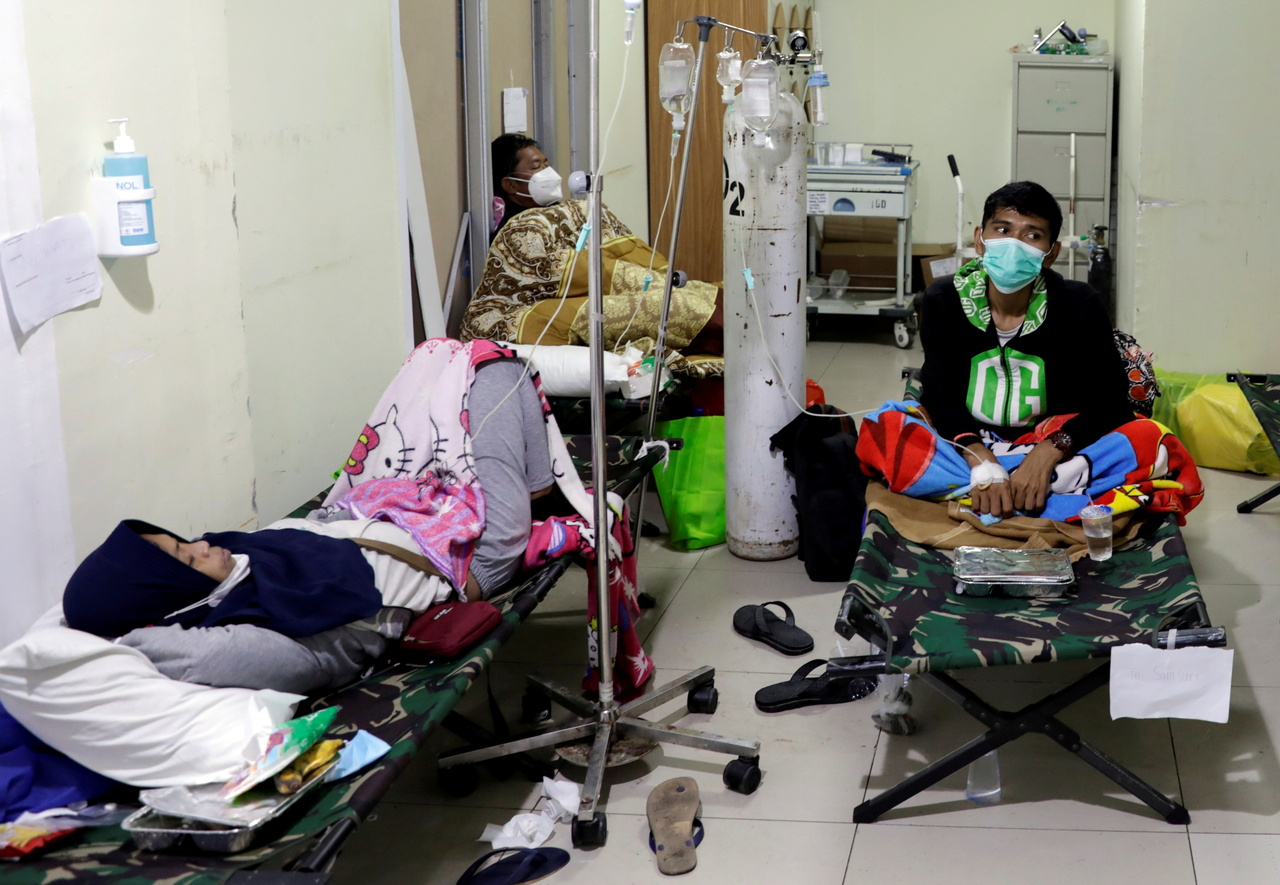Indonesian doctors face tough choice of who will live or die at overrun Covid-19 hospitals
Sign up now: Get insights on Asia's fast-moving developments

People rest on veld beds inside the emergency ward for Covid-19 patients at a government-run hospital in Jakarta, on June 29, 2021.
PHOTO: REUTERS
JAKARTA - A shortage of beds, oxygen supply and ventilators in Indonesia has left doctors with the dreadful decision of who among their Covid-19 patients will live and who will die.
Dr Nur Chandra Bunawan, 35, from Kramat Jati general hospital in East Jakarta, said: "In my 11-year career as a doctor, I've never experienced this kind of situation. It's very hard to find a hospital right now. We often have to decide which patients have a better chance of surviving. We must pick which patients have a greater chance to live.
"Why should it come to this, why must we choose? This is a hard decision. All lives are equal. But because of limited oxygen and spaces, we have to choose," added the internal medicine physician, who said he is battling fatigue and burnout.
Amid an influx of Covid-19 patients at the hospital, a few dozen of his colleagues have also contracted the disease themselves.
As Covid-19 cases in Indonesia have picked up rapidly over recent weeks, hospitals and doctors like Dr Nur Chandra find themselves forced to decide who can get beds, life support and proper medical treatment.
Indonesia's fragile healthcare system is teetering on the edge of collapse. Daily new cases have hit record highs in the past three weeks caused by the massive travel during June's Hari Raya Aidilfitri and the spread of the highly contagious Delta variant.
The world's fourth-most populous country of 270 million saw 34,379 infections and 1,040 deaths on Wednesday (July 7), both all-time high increases. The figures brought the country's total number of infections to 2.38 million and fatalities to 62,908.
Social media is swamped with pleas for help to find hospital rooms, oxygen cylinders and convalescent plasma for the sick.
Temporary tents have popped up and spaces repurposed as hospitals in Jakarta and other parts of Java, such as Bekasi in West Java and Solo in Central Java, find themselves barely coping with the soaring numbers of Covid-19 patients amid the unprecedented wave of infections.
Citizen data platform LaporCovid-19, which had helped people find hospital beds, said last week that it could no longer accept requests for assistance, as it had been very hard for its volunteers to search for vacant beds.
As overloaded hospitals turn away patients, families are racing for oxygen cylinders to take care of their loved ones, including the dying, at home.
LaporCovid-19 reported on Tuesday that 265 people in 10 provinces in and outside Java, including Riau Islands, Lampung and East Nusa Tenggara, had died after self-isolation.

Dr Galuh Chandra Kirana Sugianto, who works at two private hospitals in Jakarta, viewed the current situation as "out of control".
She said she sometimes felt "helpless" when dealing with severely ill patients amid limited equipment, particularly ventilators. Age, marital status and health history were among factors taken into account when deciding who can get a ventilator, she added.
"The young ones will be prioritised. They will be asked if they are married or single. We will pick one who is a breadwinner, still young, has no co-morbidities and possesses a greater chance of recovery," the 35-year-old internal medicine physician told ST. "We are really at a point where we must choose who to save."
The Indonesian Hospital Association (Persi) secretary general, Dr Lia Partakusuma, said while the bed occupancy nationwide still stood at 74 per cent as at Tuesday, many hospitals across Java island had already hit 100 per cent.
"Doctors generally consider who has a bigger chance of living. It's inevitable that amid this chaotic situation, those who likely can survive will be saved first," she said about the situation she called an "emergency".
Dr Lia also noted that the bed occupancy in a number of hospitals across Bali island also rose to 70 per cent, from some 50 per cent last week. Bed occupancy in hospitals in several provinces outside Java and Bali, such as Aceh, Riau Islands, South Sumatra, and Central Kalimantan, also climbed "quite significantly", she added.
Indonesia had 343,101 active cases as at Wednesday, up 18,504 from a day earlier, higher than the number of those recovered, which reached 14,835. One-fifth of the active cases require treatment at hospitals, according to Persi.

Mr Luhut Pandjaitan, a senior minister overseeing the emergency community restrictions across Java and Bali, said on Tuesday that the government was preparing for "the worst-case scenario" if daily new cases nationwide crossed the 40,000 mark, by making hospitals, medication and oxygen ready.
Among these was the conversion of the haj dormitory compound in East Jakarta into a Covid-19 treatment facility, equipped with intensive care units and able to accommodate more than 800 patients, and the use of military and police hospitals in Jakarta and Surabaya to treat Covid-19 cases.
"We are deploying all resources," he said.
A partial lockdown was imposed last Saturday across Java and Bali islands, home to 70 per cent of the overall cases, and is set to last until July 20. Less restrictive coronavirus curbs have been expanded to 43 regencies and regions across 20 provinces in westernmost island of Sumatra to easternmost island of Papua since Tuesday until July 20.


